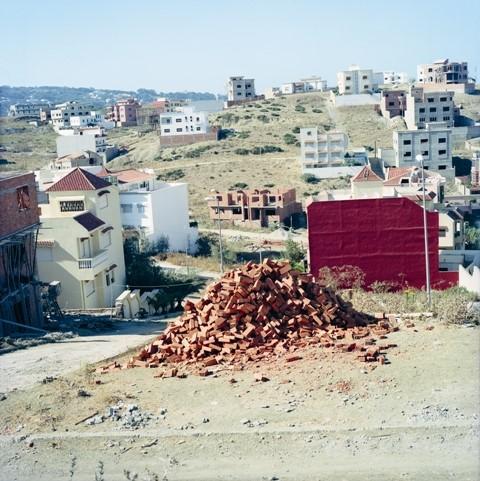Deutsche Bank presents the “Artist of the Year” 2011: Yto Barrada: Riffs
Riffs is the first large-scale exhibition in Germany of the work of Yto Barrada, whose photographs, films, publications, installations and sculptures engage with the peculiar situation of her hometown of Tangier, Morocco. With Yto Barrada, Deutsche Bank has elected a woman as “Artist of the Year” 2011 whose work has been closely involved with the political and social realities in North Africa for over a decade.
 Yto Barrada, Briques (Bricks) 2003/2011. courtesy Yto Barrada & Galerie Sfeir-Semler Hamburg/Beirut
Yto Barrada, Briques (Bricks) 2003/2011. courtesy Yto Barrada & Galerie Sfeir-Semler Hamburg/Beirut
In her first series A Life Full of Holes: The Strait Project, ten years ago, Barrada evokes a Tangier where postcolonial history has materialized one of its dead-ends. Her recent project Iris Tingitanaextends this inquiry to the fast-growing outer edges of the city, where the monocultural vision of planners and developers threaten to homogenize landscape and human lives.
The show, featuring selected works from these past series as well as new photos and films is conceived as a construction in 3-dimensional space and a deliberate juxtaposition of works. It plays on the varying distances between Barrada’s lens as a photographer and her subjects, and displays the full range media in which she works. The show’s title is inspired by music, where “Riff” stands for a rhythmic figure, a musical phrase that some players add to a written score. Riff relates also to the rugged Rif mountains of Morocco, home to insurgencies and a splinter Republic, and to the art deco Rif Cinema, which houses the Tangier Cinémathèque.
The three films, Beau Geste, Playground and Hand-Me- Downs, are also “riffing”—rearticulating spaces, sounds, and meanings. One of the recurring figures of the show is that of the tree—physical trees and family trees. Trees serve as metaphors of resistance and strength, of developing levels of vision, of generational transmission, of changing times, of shelter, regeneration and nutrition, but also of decor and tourism. Memory and obliviousness, history and unreliable narratives, as the details and fragmentation of every day life, are strongly involved in this show, and these themes are refracted between the pieces. The visitor, also, changes perspectives and levels—by mounting a mezzanine; moving from intimate projection spaces to a balcony that overlooks large walls of photos; sitting down in a screening room to watch the cinema program, presented by the Cinémathèque.
Yto Barrada grew up between Tangier and Paris, where she studied history and political science at the Sorbonne, and subsequently attended the International Center of Photography in New York. Her practice, combining the strategies of documentary with a more meditative approach to images, drove her to return home after sixteen years abroad. Now based in Tangier, she continues to engage the complex realities around her, avoiding the rigidity of any ideological discourse, and without recourse to the spectacular or melodramatic. Another of Barrada’s responses to the dynamics of the region was to co-found the Cinémathèque de Tanger, North Africa’s first cinema cultural center, which she now directs. The Cinémathèque’s film programs, workshops, archive, and traveling presentations are another investment in the unique status of images and representations in the contemporary Arab world and beyond.
Marie Muracciole


